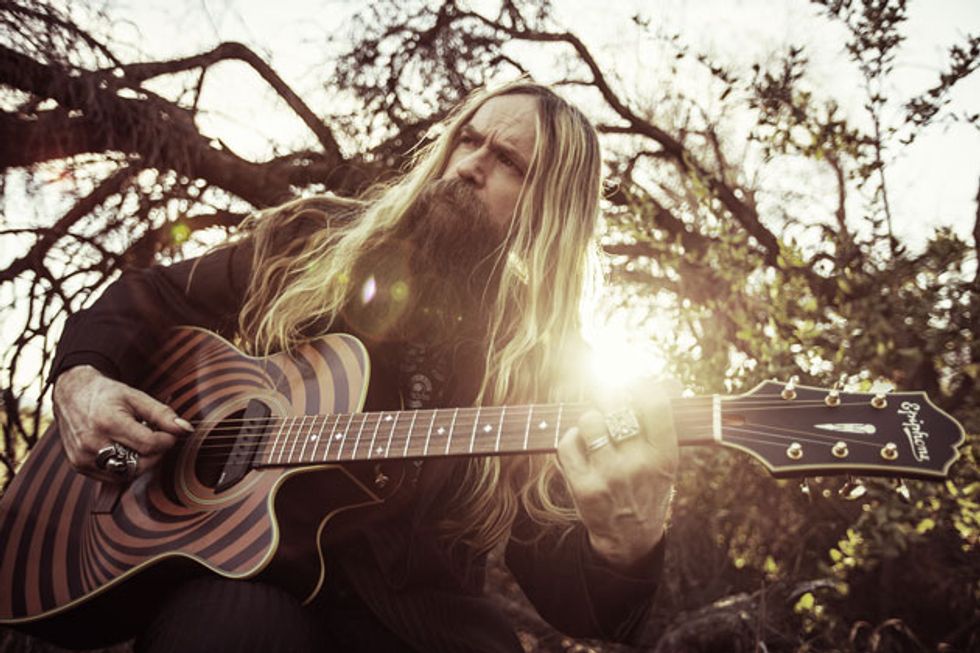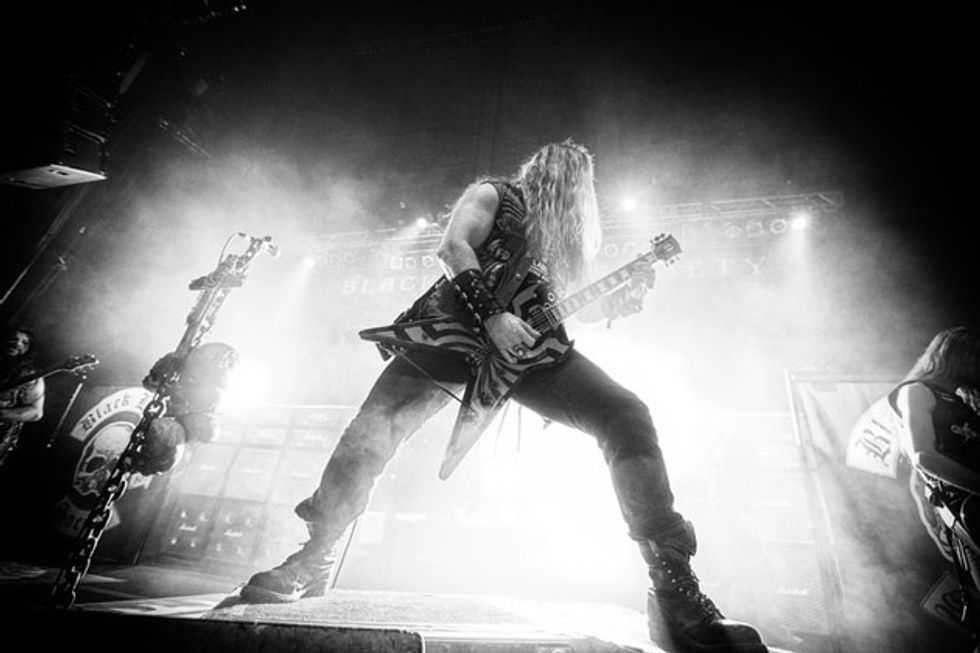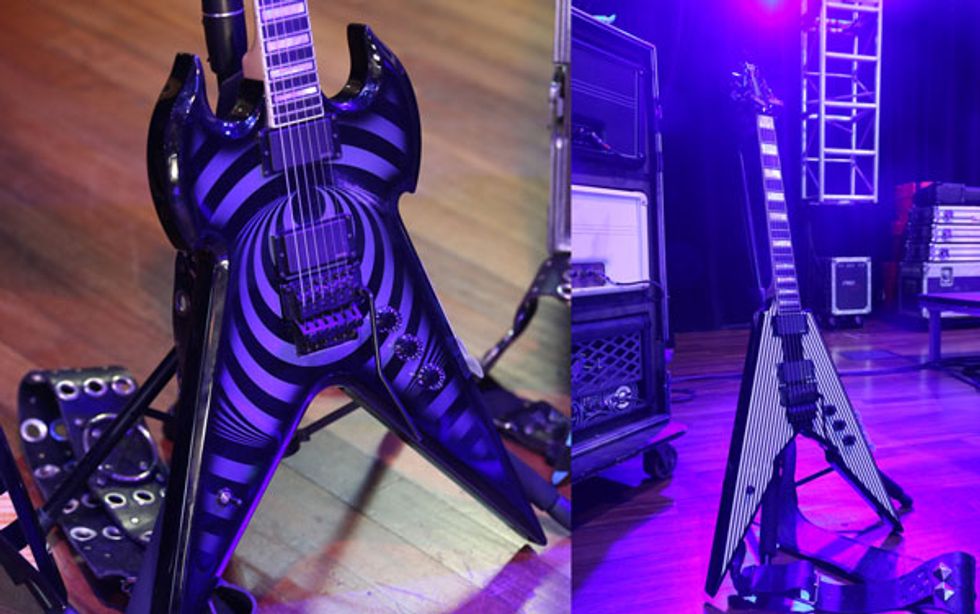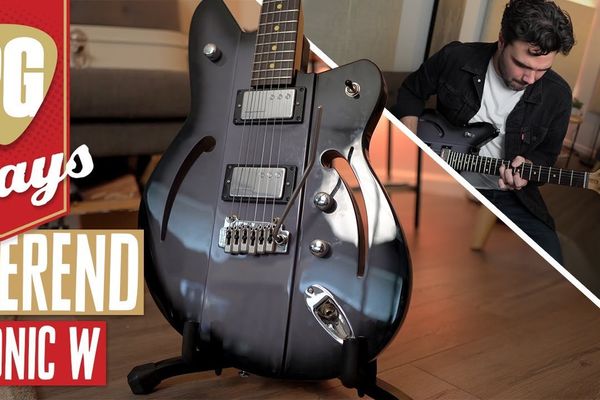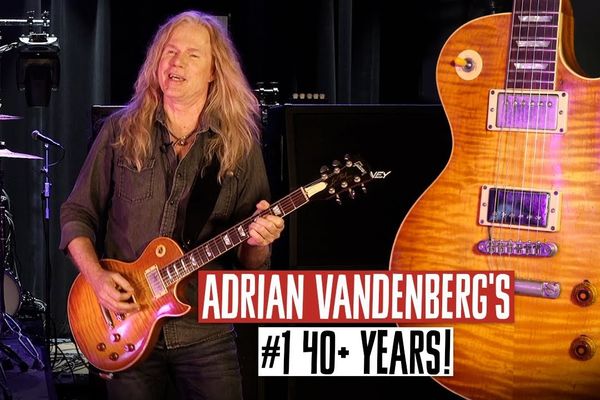The ferociously fleet-fingered fretman unveils his new line of guitars, talks about achieving roadrunner speed and composing solos, and delves into his second solo album, Book of Shadows II.
Wylde says his Epiphone Masterbilt acoustics “play like Les Pauls. The action is phenomenal.” Photo by Justin Reich
Over the course of six weeks—just prior to the release of his latest album, Book of Shadows II—Zakk Wylde rocked the house at an after-party at the NAMM show in Anaheim, California, with Zakk Sabbath (a Black Sabbath cover band he threw together), was a featured artist alongside Yngwie Malmsteen and Marty Friedman on the guitar-dominated Axes & Anchors cruise, and took part in his third Experience Hendrix tour. This wasn’t a fluke, lottery-win streak for the New Jersey-born axeman. It seems like every waking moment of Wylde’s life has been a nonstop rollercoaster ride since he first shook the earth on Ozzy Osbourne’s 1988 album, No Rest for the Wicked.
Premier Guitar experienced this relentlessness firsthand while interviewing Wylde, whose catalog includes 11 albums with his band, Black Label Society, as well as two solo releases. After getting whisked away to a relatively private section of the Grand Bar at the swanky Soho Grand Hotel in New York City, where people are generally too cool to acknowledge the presence of a celebrity, a guy that looked like he could be either an industry executive or a well-dressed fan in the right place at the right time broke the code and immediately came over and chatted with Wylde. After they were done, our interview began, and in only the first few seconds, as he showed us some videos and pictures on his phone, a barrage of texts popped up. Throughout the interview they continued pouring in from friends, family, and business folks.
Business folks? Well, while we ostensibly met with Wylde to discuss the follow-up to 1996’s Book of Shadows—an album that showcased the softer, gentler side of the 6-string behemoth—it’s impossible to ignore his indefatigable entrepreneurial spirit and rapidly expanding empire. Wylde, who threatens Kiss’ Gene Simmons’ standing as rock’s greatest branding genius, recently rolled out the Wylde Audio line of guitars. But that’s just the tip of the iceberg.
“It’s not just guitars,” clarifies Wylde “It’s guitars, amps, pedals, strings … down to everything. Eventually, outboard gear, Pro Tools plug-ins, microphones. It’s Wylde Audio!” And that’s not all. Wylde also has his own coffee: Valhalla Java Odinforce Blend, roasted by Death Wish Coffee Company.
In this interview, Wylde opens up about Book of Shadows II, shares his secrets for crafting epic solos and playing fast, and delivers the lowdown on Wylde Audio.
How did Book of Shadows II come about?
Throughout all the years of the Black Label family—the Boston chapter, the London chapter, the Canadian chapter—they’d be like, “Zakk, you ever think you’re gonna make another one of those Book of Shadows records?” My whole thing was like, “Yeah, whenever we get a break in between doing laundry, dishes, cleaning the dog, changing diapers, we’re gonna fit one in.” After we did 2014’s Catacombs of the Black Vatican, we toured that thing for two years. We also did an acoustic Unblackened run from New York to L.A., doing the mellow stuff, as opposed to the heavy stuff. It was nice breaking it up a little bit. With the 20th anniversary of Black Label Society coming up, I said, “Man, maybe we’ll knock out another Book of Shadows record while we’re at it.”
Is Book of Shadows II a direct sequel, thematically, to the 1996 original?
Nah, it’s independent of it. The only thing that’s a constant, I guess, is the style. It’s just the mellow stuff.
It’s fitting that we’re talking about Book of Shadows II in New York City, since the first incarnation of Book of Shadows was written here, 20 years ago.
Yeah. When we were tracking Ozzmosis, we stayed on 34th and Lexington. We’d be drinking in every Irish tavern that we could find until 6 or 7 in the morning, and we’d end up in this one bar called Brew’s, which had been there since 1903 but is gone now. The jukebox had everything from Neil Young to Elton John, Bob Seeger to the Eagles. After we got done there, we’d crawl over to the hotel and be jamming on the acoustic and write. That’s what became the Book of Shadows stuff.
Book of Shadows II focuses on the sentimental side of your personality, and throughout the years you’ve covered songs like “Candle in the Wind” and “Ain’t No Sunshine.” It’s great that you’re not suppressing the softer side of your music.
As much as I love listening to Zeppelin doing “Black Dog,” I love it when they do “Going to California” or “That’s the Way,” or anything like that. Same thing with Neil Young when he does, “Hey Hey, My My” with Crazy Horse—the super heavy version. I love it when he’s also sitting with an acoustic and does it by himself.
“Darkest Hour” has the most explosive solo on the album. How do you get in that high-energy zone against a relatively mellow track?
It’s just like how I work out all solos—the Saint Rhoads school of soloing or the Neal Schon school. It’s composed, where you got the melodies and then you put your little fast things in there. It has a beginning, a middle, and an end. When we were doing the tracks for that solo, I just kept going and going and going. I was like, “Man, let me just extend the solo out for this one.” I remember I’d be listening to it in the truck. When I’d be driving, I was humming melodies to it and saying, “I’ll put in a little Al Di Meola bit over here. I’ll put a melody over here. I’ll put a Neal Schon thing over here, a Saint Rhoads thing here, a Frank Marino thing here.” There are a lot of parts. You sit down and work out a solo until you’re happy with it.
You’ve taken part in the Experience Hendrix tour. Did the influence of any of the other guitarists rub off on you?
All the guys are amazing, phenomenal players. You got Eric Johnson, Kenny Wayne Shepherd, Eric Gales. I’m a fan and I enjoy listening to them. The thing is, whether they’re all playing pentatonic scales or diatonic scales, it doesn’t matter. They still sound like themselves.
YouTube It
Watch Zakk put his Gibson Flying V through its paces in this extended solo, captured onstage in Helsinki, Finland. The guitar has EMG pickups, a Floyd Rose locking vibrato arm, and volume/volume/tone controls with a 3-way switch.
With a new solo album and a spate of touring under his belt, Wylde is now turning his attention to marking the 20th anniversary of his Black Label Society. Photo by Tim Bugbee
Speaking of pentatonic scales, when you play your hyper-fast pentatonic runs it seems like your right palm is completely off the strings. How do you keep the open strings muted?
I don’t know, but I know what you’re talking about because all of the other strings would be feeding back and shit like that. The claw [laughs and maneuvers hand, trying to figure out how he does it]. Well it’s definitely being muted because, like you said, things would be feeding back.
Zakk Wylde’s Gear
Guitars
Wylde Audio Odin
Wylde Audio Warhammer
Wylde Audio Viking V
Wylde Audio prototype acoustic
Loucin Buzzsaw acoustic
Amps
Wylde Audio Master 100 (100-watt head)
Wylde Audio cab with Electro-Voice Black Label Signature 300-watt speakers
Effects
MXR ZW44 Zakk Wylde Signature Berzerker Overdrive
Dunlop ZW45 Zakk Wylde Signature Cry Baby Wah Wah
Dunlop ZW357 Zakk Wylde Signature Rotovibe Chorus/Vibrato
MXR ZW38 Zakk Wylde Signature Black Label Chorus
Wylde Audio phaser prototype
Strings and Picks
Wylde Audio electric (.010–.046 and .010–.052)
Wylde Audio XL Extra Light acoustic (.012–.054)
Dunlop Ultex Sharp 1 mm picks
Monster cables
To me, it’s all preference. And everybody’s technique is different, too. When you look at Yngwie’s technique, he barely moves his picking hand and he’s nailing every one of those notes. You know how flawless he is. He’s smooth as silk. And you look at Steve Morse’s technique, it’s completely different from Yngwie’s, and Van Halen’s is completely different from theirs. That’s the beautiful thing about guitar—everybody’s voice is really different. Just the way they attack it: staccato, legato. Al Di Meola is all staccato. Allan Holdsworth is all legato. If Holdsworth was picking every note, he wouldn’t have that sound.
Do you have any tips for players who want to achieve your lightning speed?
Anyone that plays fast will tell you: the closer you are, and the less movement, the better it’s going to be. And I’m talking about some of the younger guys that play lightning fast. I can play fast but not anywhere near the league of some of those guys—and the pick barely moves.
There are bonus tracks on the deluxe version of the album that feature piano arrangements of guitar-driven songs like “Tears of December.” Did you write these songs on piano first?
Those songs were actually written on guitar. The thing that’s always bothered me about bonus tracks is that everyone’s perception of a bonus track is that they’re half-assed songs that couldn’t make the record. We did the last record and I thought, “These are bona fide songs that should be on the record. They’re not B-side songs.” That’s why we always do cover songs. They’re fun to do and by your favorite bands, but that way you’re also not getting rid of songs that could be on the next album. On the last record, I did “Scars” on the piano all by myself, so I definitely dig doing different versions of these songs. And then you have heavier versions with the band.
Let’s talk gear. How did Wylde Audio come about?
It was the next logical step. It’s a matter of Derek Jeter being a player, then a coach, then a GM, then vice president, and then the next move from there would be team owner. I love being involved in everything. It’s the same with the band. I love being involved in the writing, the producing, the mixing, the artwork—down to the merch. When parents ask for advice for their kids, I’m like, “You don’t want to have a crappy job. Who wants that? If you want to do music for the rest of your life, then make the band your job. Make music your job. Everything you do should involve music in one form or another.”
The beautiful thing about having your own company is that you and me could be sitting here going, “What kind of wood is on this table? This top would make a great guitar.” And we would find out what kind of wood it is, get a batch of it, and do a limited run with this ass-kicking wood. Or if you take an old pedal, like an Echoplex … now, we love the old ones but they don’t make them anymore, and if you look at them the wrong way, they break. But me and you could just rebuild it, add things to it that we think would be great, and make sure that you can drop it off a 10-story building and it ain’t going to break. You can take existing ideas and improve upon them. So you have that outlook on it as well as being able to create something altogether new.
Was there any bad blood with the companies that made your previous signature gear throughout the years?
I couldn’t have asked for anything more from Marshall, Gibson, Epiphone, and Dunlop. Not only did I endorse the companies that all of my heroes used, I was afforded the opportunity to actually create with them. So I’m truly blessed. They’ve been my family since I started with Oz. Nothing’s changed in that regard, and that’s always gonna be where I came from and part of who I am.
Did you use the Wylde Audio guitars on Book of Shadows II?
I used a bunch of the guitars on the new record and, obviously, those are the new amps as well.
On songs like “Tears of December” and “Forgotten Memory,” there’s a mild overdriven sound on your solos. How are you achieving that?
This is a weird thing. When I was using my Marshalls, I’d have the gain all the way up and the master would be cranked. For me to play clean, I would just turn the distortion off and roll my volume down. That’s my clean sound.
Whenever my buddies play through my rig, it’s a lot cleaner than they think it is—even on “Darkest Days” and stuff like that. There’s sustain, at least more sustain than an acoustic guitar, but a lot of my friends are like, “Wow, I thought it would be dirtier than that.” Nah, it’s clean. When you hit a G chord, you can hear all the notes.
Wylde Axes
Although Wylde Audio has yet to put its amps and effects on the market, the company has three flagship guitar models available: the double-winged battle-axe called the Warhammer, the more-contoured-Les-Paul-shaped Odin (on the left), and the V-profile Viking. Zakk has been playing the instruments in concert, and during a recent Rig Rundown in Nashville, he introduced Premier Guitar to his flotilla of Warhammers and Vikings, including this Warhammer Pelham Blue FR and Viking V Pinstripe FR. Both guitars have EMG 81/85 pickups and Floyd Rose 100 Series locking vibrato arms. Photo by Perry Bean
